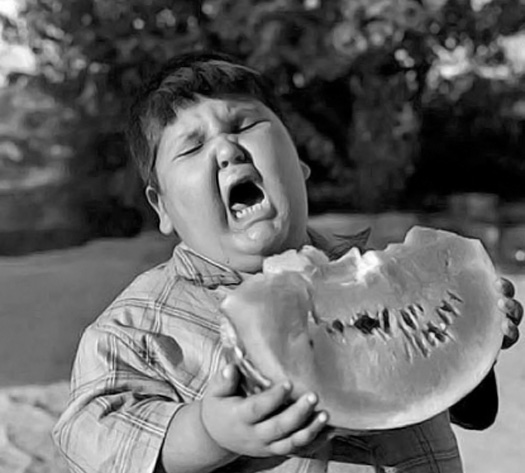
In the pantheon of taboo subjects, none is more difficult to address (or more potently visual) than obesity. It's at once a stark reality and a cautionary tale, associated with serious economic consequences and no shortage of health complications — yet remains, to many, pure fodder for comedic opportunism. From Fats Waller to Fatty Arbuckle, Chris Farley to John Candy to a host of self-anointed celebrities, the public at large has been groomed to laugh at fat people, many of whom claim that they can't help being fat.
What do we talk about when we talk about fat?
It used to be that we considered a fat baby a healthy baby, but today it's no longer actually clear what actually constitutes fat. In the United States, the fight against childhood obesity may gain some traction now that it is being spearheaded by America’s First Lady, yet apparently what we define as hunger (respectfully referred to as “food security” by the Department of Health and Human Services) persists — even as the classic profile of malnutrition does not.
Not to overstate this, but here in the land of plenty, a bloated belly is a bloated belly.
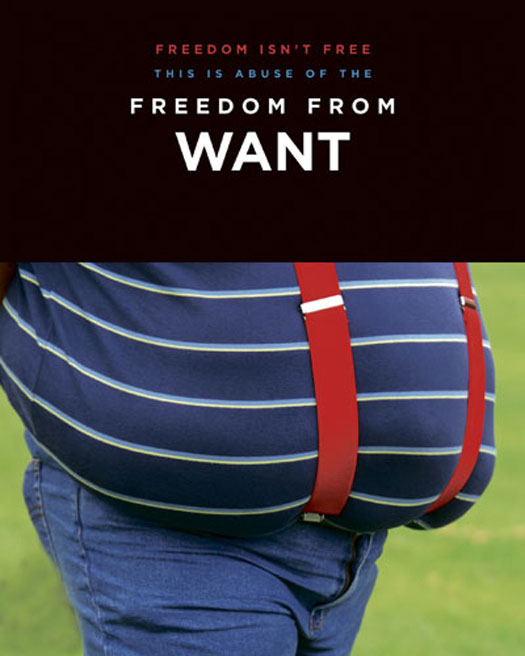
Increasingly however, this isn’t only an American problem. As early as 1999, the United Nations reported that obesity was on the rise in developing countries, including Asia, Latin America and Sub-Saharan Africa. The proliferation of so much fast food in densely urban places like Hong Kong and Shanghai leads to both inactivity and increased snacking. “Chunky sturdy kids are not the problem,” notes one Asian news source. "Fatties are.”
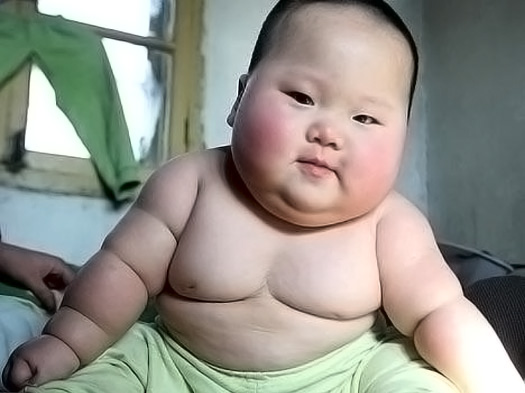
And yet despite such alarming real-world statistics, morbid obesity remains the stuff of comedy. “Fat suit” movies are believed to have originated with the scene in Monty Python’s 1983 The Meaning of Life, in which Terry Jones' chunky gourmand Mr. Creosote consumes an enormous banquet, only to explode, following the meal, when he pops an after-dinner thin mint.
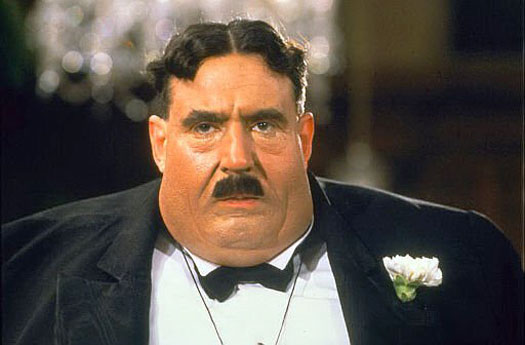
Mr. Creosote from The Meaning of Life, 1983
Since then, box-office stars like Mike Myers, Eddie Murphy and even Gwyneth Paltrow have followed. (Not long ago, producers from Entertainment Tonight sent two fat-suit covered size-2 models out into the streets with a hidden camera to capture the public’s response to their beefed-up size.) But perhaps the greatest visual satire lies in Pixar’s dystopian Wall-E, a world where bloated humans navigate in automized easy chairs, with supersized disposable cups permanently poised for instant beverage refills. Sure, they’re animated figures, one step removed from reality by virtue of being in a cartoon — yet somehow, the fact that they’re caricatures makes them no less menacing.
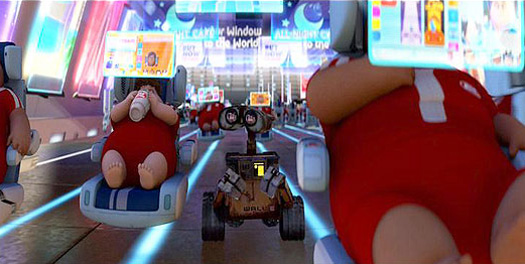
Wall-E, Pixar, 2009
Television programmers take the opposite position, experimenting with different formulas for drawing viewers not with comedy so much as with reality, from ABC’s allegedly positive "Huge", starring Nikki Blonsky, who heads an entirely plus-size cast; to the Style Network’s allegedly inspirational “Kirstie Alley’s Big Life" and Fox's "More To Love." But by far the biggest draw remains NBC's “The Biggest Loser" — and it is likely that the staggering before-and-after photos are the real draw here, as they provide incontestable visual evidence of what is, in fact, startling physical — ergo visual — change.
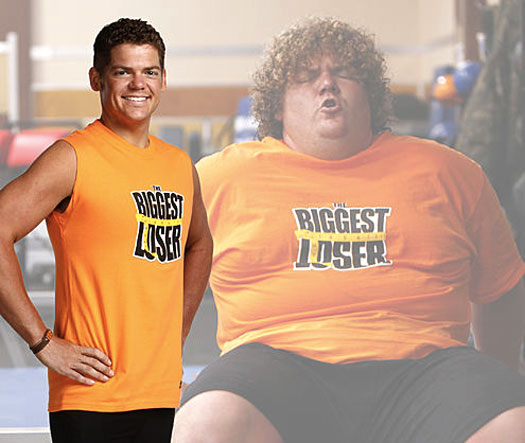
Contestant from the Biggest Loser
Such comedic efforts pale by comparison to YouTube, of course — an environment in which censorship is rare, and where such burlesque fits of absurdity have achieved significant scale without the use of fat suits. More than 50,000 people have seen Fat Lady Exercising, while some 150,000 have watched Fat People Falling Down.
And so it is, too, with consumer magazines who provide an eager public with tales of celebrity weight loss and the secrets — renewed love, religious devotion and questionable pharmaceuticals foremost among them — behind extraordinary visual displays of bodily redemption. If shapeshifting has its roots in classic mythology, then it should come as no surprise that weight loss entices viewership through the promise of precisely this: eat less, exercise more, and then show off your new-and-improved physique on national television where you will be publically humiliated if you fail to change. If, on the other hand, you do succeed in shapeshifting to a slimmer you, you'll win cash and prizes.
A simple enough equation, except that advocates of the so-called fat acceptance movement — which, incidentally, has been around for some forty years — vehemently oppose such practices. "Fat acceptance isn't a rebellion against The Biggest Loser … it's about social justice and about valuing human diversity. Fat acceptance is not about trying to be fat. It's about not hating our already fat bodies, and about fighting anti-fat stereotypes, prejudice and discrimination.”
Their premise — and there is an entire portion of the blogisphere known as the “fatosphere” where they write quite persuasively on this topic — is that all body types should be accepted. To the extent that diversity rests on tolerance, they are right: and if you believe, as they do, that obesity — like race or religion or infirmity — is not a choice, then we should all abstain from fat-suit wearing ridicule and finger-pointing judgment, period. This includes FatBooth, an iPhone app that lets you retrofit a portrait into a quick (but highly realistic) double-chin. It's silly and easy and provides a quick fix of what is essentially Schadenfreude: Thank God I don't really look like that, you tell yourself. It's harmless, too: if you shake the phone, you lose those unwanted pounds in a flash. Think it’s ever really that easy? Fat chance.
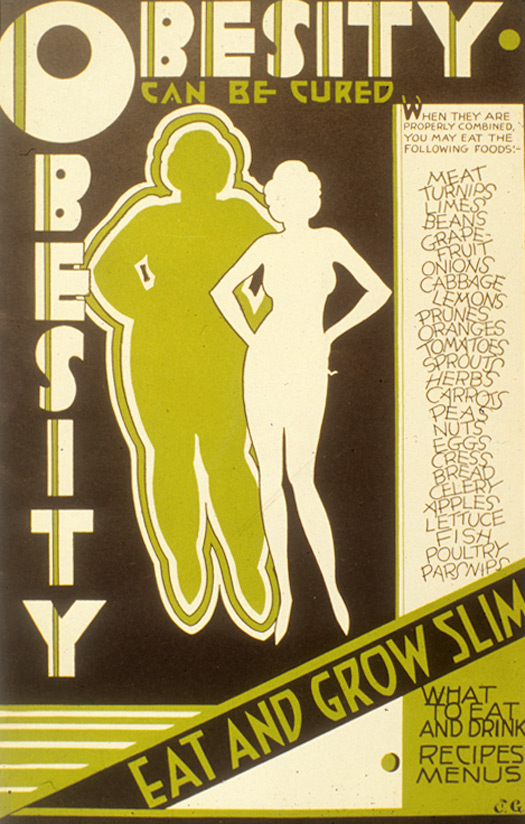
This is part two of a two-part essay on the visual nature of body image. Part one, which looks at eating disorders including anorexia nervosa, appeared earlier this week.
Such comedic efforts pale by comparison to YouTube, of course — an environment in which censorship is rare, and where such burlesque fits of absurdity have achieved significant scale without the use of fat suits. More than 50,000 people have seen Fat Lady Exercising, while some 150,000 have watched Fat People Falling Down.
And so it is, too, with consumer magazines who provide an eager public with tales of celebrity weight loss and the secrets — renewed love, religious devotion and questionable pharmaceuticals foremost among them — behind extraordinary visual displays of bodily redemption. If shapeshifting has its roots in classic mythology, then it should come as no surprise that weight loss entices viewership through the promise of precisely this: eat less, exercise more, and then show off your new-and-improved physique on national television where you will be publically humiliated if you fail to change. If, on the other hand, you do succeed in shapeshifting to a slimmer you, you'll win cash and prizes.
A simple enough equation, except that advocates of the so-called fat acceptance movement — which, incidentally, has been around for some forty years — vehemently oppose such practices. "Fat acceptance isn't a rebellion against The Biggest Loser … it's about social justice and about valuing human diversity. Fat acceptance is not about trying to be fat. It's about not hating our already fat bodies, and about fighting anti-fat stereotypes, prejudice and discrimination.”
Their premise — and there is an entire portion of the blogisphere known as the “fatosphere” where they write quite persuasively on this topic — is that all body types should be accepted. To the extent that diversity rests on tolerance, they are right: and if you believe, as they do, that obesity — like race or religion or infirmity — is not a choice, then we should all abstain from fat-suit wearing ridicule and finger-pointing judgment, period. This includes FatBooth, an iPhone app that lets you retrofit a portrait into a quick (but highly realistic) double-chin. It's silly and easy and provides a quick fix of what is essentially Schadenfreude: Thank God I don't really look like that, you tell yourself. It's harmless, too: if you shake the phone, you lose those unwanted pounds in a flash. Think it’s ever really that easy? Fat chance.

This is part two of a two-part essay on the visual nature of body image. Part one, which looks at eating disorders including anorexia nervosa, appeared earlier this week.


Comments [10]
09.09.10
10:08
In an extreme comparison, I can see this turning into the new "War on Drugs". Do you take down the dealers and suppliers, or do convince the customer base the product isn't worth the consequences? Both equally difficult, and damn near impossible.
To reply to John's comment, I think "the times, they are (sadly) a changing."
09.09.10
10:59
Someone who is 100 pounds overweight or more is literally carrying around another human being. The additional strain on their heart, organs, and pumping extra amounts of blood, is not healthy or comfortable.
Being emotionally or psychologically comfortable in your own skin, also encompasses a certain amount of self love and respect for our bodies, which carry us through life and all of our experiences.
To my mind, being morbidly obese and accepting that condition, is not acceptable, mentally or physically. It's a form of denial that there's a problem. One has to abuse one's body to some extent in order to become overweight, whether that's through not enough physical activity, overeating, or a combination of both. The percentage of people who are overweight because of a physical condition or thyroid problem is extremely small. Most everyone is overweight because they simply eat more calories than they're expending.
If you love yourself, you'll take care of your body. And this applies to both ends of the spectrum - anorexia/overeating.
09.09.10
11:00
09.09.10
03:39
Consider as well where so much obesity exists: it's not a wealthy person's problem as much as it is for the poorer socio-economic classes. Corn is cheap and can be mutated into pretty much anything, and well...it's a big, giant, awful culprit for the obesity problem. In less well-off areas, the food stores are a) probably a convenience store or attached to a gas station, and b) filled with things with an expiration date far, far into the future, that are filled with unusual chemicals. For that matter, go to ANY place that sells food--even Whole Foods--and take a gander at how much of it is processed (i.e., even just slightly changed from it's original form; that means fruit/vegetable juice, too!). Then look at the foods that masquerade as healthy--nuts, dried fruits, etc. Realize also that your average banana, apple, or orange is basically a sack of sugar, a warped derivative of what it was thousands of years ago (remember: carrots were originally DEEP RED, not bright orange). Literally millions of people have been misinformed and not only had other choices essentially muscled out, but told that bad stuff is good for you.
Granted, in this day and age you can go and do research on the internets, but you're more than likely to find wildly conflicting advice and essays with suspect scientific backing. The more credible stuff is hard to find and often difficult to understand. Yes, healthy living is a choice but you still can't excuse the rampant misinformation that's created this alarming--and growing--problem.
If I had my way, I'd make Gary Taubes's "Good Calories, Bad Calories" required reading, and get people to understand how your body reacts to food. I'd end the smear campaign against fat and severely restrict access to sugar (especially the refined, wildly artificial types) for children especially. I'd lobby for greater availability of grass-fed cows, in order to increase access to healthier meat and milk. I'd let chickens eat bugs and make sure that vegetables were common and affordable and easily found.
The biggest challenge is that there are too many profits at stake to really take down obesity. While the epidemic affects all of us negatively, on a grand scale, it's a gold mine for individual companies. Pharmaceutical companies profit from you being fat and sick, and the food companies profit from making you that way. It's a vicious, dangerous cycle.
Call me crazy for drinking heavy cream, eating a pound of fatty red meat, having 2-4 eggs/day, and not shying away from (pastured) butter, but I'm also 5'10", 160lbs, and a very competitive athlete who hasn't been remotely ill in years. Wander on over to www.paleonu.com, connect with the motivated people there, and we'll see what can be done.
09.09.10
05:52
Jessica: Love the reference to WALL-E. That image of everyone having lost the ability to walk due to overeating is excellent commentary, but has been overlooked (or, I overlooked the reaction). ... I went to look at Fat Lady Exercising, and found I couldn't watch the whole thing, even though it's only 37 seconds. Too painful, no matter how proudly limber she was. ... I was interested in your suggestion that we should stop judging fat people, and though I agree with it, I also do it (also not proudly), even though I'm as reconstructed (at least physically) as they come: As you know, I'm maintaining a 150-lb-plus weight loss for almost two decades. I disclose my hard-to-kill tendency to judge fat people because, I feel, it reveals how deeply ingrained such judgements are in all of us. There are probably vestiges of self-hatred in that, but I'll leave that for me and the shrink.
Derek: Eddie Izzard's comment is, IMO, not only not funny but not helpful. Fat people need to eat differently, mostly likely, but they need to eat. (Yes, I can be unreasonably humorless on these topics, but in my defense, I can also be fun at parties.) ... I agree with you it will be very difficult to counter the trends toward obesity. In my opinion, commercial food interests are the most pernicious in this regard; their very viability as profit enterprises depend on our eating more. We, the buying public, can change, but weak curiosities such as the government's food pyramid stand little chance against the monied brainwashing we encounter daily.
Belle: I agree with you that fat acceptance is not a defensible stance, even if it has healthful elements to it. I pray daily, literally, to accept myself exactly as I am, even as I try to get better a day at a time. That's paradoxical: If I'm acceptable as I am, why do I need to change? And yet, again quite literally, accepting the totality of who and where I was proved a prerequisite to change. I also agree with you that the reason that fat acceptance is not acceptance is the concrete, observable, life-sullying, life-threatening health deficits that result. So what if I'm cool with my body, if my body's condition will lead me to an early grave? People have the right to take that stance, but they also have a right to commit suicide. Extreme obesity is nothing less than suicide on the installment plan, adding dollops of psychic and physical misery as bonuses before the end.
I discuss issues such as these on my blog, which is at michaelprager.com. I have written a book, "Fat Boy Thin Man," which explores these topics. The book's website is fatboythinman.com; the paper version of the book will be available in October. Please check these out, if you have the interest.
09.10.10
11:32
Belle is clearly a fan of the Biggest Loser as well. There's more at play here than fat people's psychological mindset. I also take a softer-line.. look around you, some people have frames meant for more weight than others. I'm totally willing to entertain that there's big reasonable variance and that some people are just more predisposed to be heavy.
The fat acceptance movement. Good body image is important, but I'm hoping some of this discourse has really moved on to taking a hard look at our food system. This isn't fat in the way we knew it 20 years ago, 50 years ago. There's something really wrong.
Brad mentions Food Inc.. Yes, it's not just issues about exercise or portion size or laziness but also fundamentally about what we are eating. Take a macro view for a moment to check this biodiversity video from Vancouver Film School http://vimeo.com/14105623. We're not eating any. Kind of shocking, right? Maybe the 21st century industrial food production model is already, well, killing us.
Michael Pollan has great advice here. Our fear of fat in foods is just the latest in long time of cure-alls and dire warnings. It's mostly a racket. Oat bran anyone? The trick is to look for real food. FOOD. The fewer ingredients on the packet tends to be a very good sign. We are healthy by trying to eat a variety of things with whole ingredients that don't need health claims. Because they're food. If your average American was turning to carrots and bananas (even weak supermarket ones, while looking out for added sugar, preservatives, etc.) that would be an improvement to current choices.. or options. Remember a lot of people right here in the US not only can't afford fruits/vegatables as well as they should be able to but also do not have access to them. NYC is currently engaged in getting fruit carts out to areas like Upper Manhattan that barely have reasonable produce available at all.
Obesity is a huge problem (sic) and it's gotten worse even in the past 5 years. The health care strain is gigantic. The numbers are insane. For instance: one in three children (35%) in Texas is overweight or obese. (www.dshs.state.tx.us/obesity/pdf/THIPolicyBrief06.pdf).
Kind of a perfect storm, right? Driving can cut down on your day to day walking, the huge plates at Olive Garden, the fat-free cookies = total garbage, enormous cheap bottle of corn-syrup soda at the supermarket, no fruit at the bodega.
When was the last time you saw dirt on the produce? Maybe that's what's icky.
09.10.10
12:10
We only have one body, and as Michael suggested, you can literally commit suicide with food, in the same way an alcoholic, drug addict or anorexic commits suicide through their unwillingness to take control of their problem or find ways to change the mindset that brought them to the brink of physical peril.
Ultimately, being life threateningly overweight or underweight is a psychological issue, not just a food/health issue. Yes, the food industry has changed food to suit our lifestyles. They have eliminated much of the variety of fresh produce. They created sugar and corn saturated products that provide little nutritional value, but create changes in the brain, insulin highs and lows, and we've seen increased portion sizes over the years. But overeating, like under-eating is a form of abuse, which has to stem from some form of unaddressed pain/grief/sadness/anger/self-loathing.
I believe the focus on fat people in society through television, film and media as comedic caricatures, may be a form of avoidance and simultaneously, limited acceptance. If the fat person uses humor to make others laugh, before people have a chance to snicker, stare or ridicule, then the overweight person gets to avoid some of the negativity, so it reinforces their role as the stereotypical "jolly fat person" through which, they begin to form their identity, which only entrenches their self image as fat.
With media and tv, focusing on "fat" as comedy, the media gets to maintain their focus on attractive, slim actors and celebrities, and the fat person exists as the "foil", thus avoiding the ire of the overweight demographic who watch tv, but also providing them with a seemingly unattainable and elusive but ever enticing, slim ideal as the "lead".
People want to look at attractive people. It's normal. It's hard wired in us all. Either very underweight or very overweight is not considered attractive to the majority of society, and that's a fact that may be hard for some to acknowledge, but it's most probably a biological imperative. It can't ALL be cultural. Our main biological imperative is to find a suitable mate. Culture itself, however nihilistic, ridiculous or dangerous is mostly an extension of our neurology or aka - lizard brain.
If we think about the way that food has changed and evolved in such a short time, we haven't evolutionarily changed enough to find our systems able to consume the types and amounts of food we are now, without suffering physically. So evolutionarily, we haven't caught up with the availability of food now versus the hunter gatherer methods of several thousand years ago. And additionally, it's hard to know how much is hard wired in us to be repulsed by either the very underweight or the very overweight.
I modeled for several years and I could go on ad nauseam about anorexia, bulimia, drug abuse etc within the modeling industry, but that's probably better suited for the other column, since the forces at work to entice people to overeat or to starve themselves, are different but they do share something in common... They're encouraged through massive marketing campaigns and image saturation, the exploitation of people's vulnerabilities, neuroses or addictive tendencies in order to create massive profits.
09.10.10
04:51
None of them have any fucking idea of how hard it is to loose weight or be ostracized by society or why people gain weight.
People may be overweight for a variety of reasons including poverty and lack of access to ANY supermarket in some cities; jobs and health issues preventing regular exercise (causing one to gain weight then be overweight); increased meal portion sizes all around - at home, in restaurants, and in packaging (when does anyone EVER need 12 OZ of sugar water in the form of soda or juice?); overly processed foods with added sugar and salt and, last but not least; our poorly designed cities and suburbs and the automobile culture it created (or the other way around). Most Americans have no choice but to drive for almost everything they need. While in Europe, people actually stroll down pedestrian malls and shop, then have a nice slow dinner, then walk home. Lots and lots of walking. Everyday.
Except for those truly with eating disorders, the averages for all American’s BMI has increased. This summer I saw nothing but overweight young women in bikinis in my high income mostly suburban Connecticut beach town. But 10 or 20 years ago, I saw hardly any. The average body fat is up for the young to middle aged and that is not the persons fault, it is all of it.
A lot will need to change to make this issue recede, so to speak. Getting down on fat people or your kids or anyone is like telling a smoker they should quit and they should know better. They are addicted. Our bodies, through evolution, save for a day when we are starving. It is very easy to put on weight and very hard to take it off.
Here’s a great (if horrible looking) chart from the CDC on trends in obesity ages 20-74 year olds.
http://www.cdc.gov/nchs/data/hestat/overweight/overweight_05_06_fig2.GIF
Overweight (love handles) has really not gone up much. About 31-33% of the population.
Extremely obese has gone up but only by about 5% over 35 years and again, was a small part of the total population historically. About 1 to 2%.
But obese Americans, which before the late 1970s, were about 12-15% of the population, has increased 20% with the steepest graph line and now surpassing the overweight Americans.
What changed in 1976 and got worse until recently? More people and the pollution centers shifted to the suburbs. Manufacturing left the cities and went overseas. Jobs went from walking to work or taking a street car and walking to driving to work from one suburb to another. Fastfood and convenience food exploded. Packaged and process foods began to replace traditional foods. Increased chemical use in farming meant lower nutrients in the soil and the food. Use of sugar and salt in processed foods increased. Meat processing shifted to factory farming. Fat increased in animal protein. Variety of foods that traditionally were more complex, were reduced to hybreds (thankfully, some heirlooms are coming back).
Agribusiness, fast food, processed foods, automobiles, land developers, excess television viewing (now computer viewing), and jobs that went from labor to desks are why we all gained weight.
09.13.10
09:58
11.30.10
05:13